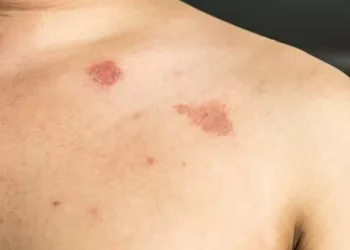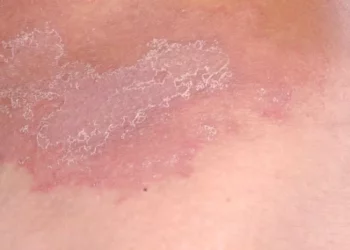Ringworm is a common skin infection that can affect puppies. Despite its name, ringworm is not caused by a worm. It is a fungal infection caused by dermatophytes, which are fungi that live on the skin, hair, and nails. These fungi thrive in warm, moist environments and can spread easily from one animal to another. In this article, we will explore the causes of ringworm in puppies, how it spreads, the symptoms to look for, and how to treat it.
Understanding Ringworm and Its Causes
Ringworm is a fungal infection that affects the outer layer of the skin. It is caused by a group of fungi known as dermatophytes, which include species like Microsporum canis, Trichophyton mentagrophytes, and Epidermophyton floccosum. These fungi live on the skin and hair of infected animals and can spread to other pets and even humans.
The fungus thrives in areas that are warm and moist. It is often found in places where animals, especially puppies, are housed in crowded conditions. Ringworm is highly contagious and can spread quickly, particularly in environments where there are multiple pets.
The Role of Fungal Spores in the Spread of Ringworm
Fungal spores are responsible for spreading ringworm from one animal to another. These spores are microscopic and can be released into the air when an infected animal scratches, licks, or shakes its fur. The spores can then land on surfaces like bedding, carpets, or furniture. If another puppy or animal comes into contact with these spores, they can become infected.
Puppies are particularly susceptible to ringworm because their immune systems are still developing, making it harder for them to fight off infections. Additionally, puppies are naturally curious and may come into contact with contaminated surfaces or other infected animals more often.
How Puppies Contract Ringworm
Puppies can contract ringworm in several ways. The most common method of infection is direct contact with an infected animal. Puppies that interact with other animals that are carrying the fungus, whether they are other dogs, cats, or even wild animals, are at a higher risk of developing ringworm.
Indirect contact with contaminated surfaces is another common way that puppies get ringworm. The fungal spores can survive on surfaces for long periods, so if a puppy comes into contact with items such as toys, bedding, or grooming equipment that have been used by an infected animal, they can contract the infection.
In some cases, the fungus can be transmitted from humans to puppies. People who have ringworm may unknowingly spread the infection to their pets by touching them, particularly if they have not washed their hands after handling an infected animal or object.
Risk Factors for Ringworm in Puppies
There are several factors that can increase a puppy’s risk of developing ringworm. These include:
Age: Puppies are more likely to get ringworm than adult dogs because their immune systems are not fully developed.
Weakened Immune System: Puppies with weakened immune systems, due to stress, malnutrition, or other underlying health conditions, are more vulnerable to fungal infections.
Crowded Living Conditions: If a puppy is housed in a shelter or kennel with many other animals, the chances of being exposed to ringworm increase.
Poor Hygiene: Poor hygiene and lack of regular grooming can also make puppies more susceptible to ringworm. Fungal spores thrive in dirty and damp environments, making it easier for the fungus to spread.
Contact with Infected Animals: Puppies that come into contact with infected animals, especially other dogs, cats, or wildlife, are at a higher risk of contracting the fungus.
Symptoms of Ringworm in Puppies
It can be difficult to detect ringworm in puppies at first, as the symptoms may be mild and easy to overlook. However, as the infection progresses, it becomes more noticeable. The most common symptoms of ringworm in puppies include:
Circular, Bald Patches: One of the most noticeable signs of ringworm is the appearance of circular patches of hair loss, which often have a red, scaly ring around them. These patches can appear on the face, ears, paws, or tail.
Itching and Scratching: Puppies with ringworm may scratch or bite at the affected areas to relieve itching. This can make the infection worse and lead to further skin irritation.
Flaky or Scaly Skin: The skin around the infected area may become dry, flaky, or scaly. This is a result of the fungus feeding on the keratin in the skin and hair.
Redness and Inflammation: Infected areas of the skin may appear red, inflamed, and irritated. This can cause discomfort for the puppy.
Crusty Scabs or Lesions: In more severe cases, the infected areas may develop crusty scabs or lesions. These can bleed or ooze, especially if the puppy continues to scratch the area.
How to Diagnose Ringworm in Puppies
If you suspect that your puppy has ringworm, it is important to seek veterinary care for an accurate diagnosis. A veterinarian will typically perform a few tests to confirm the presence of the infection. These tests may include:
Wood’s Lamp Examination: This is a special ultraviolet light that can detect the presence of certain fungal species, including Microsporum canis. However, not all cases of ringworm will fluoresce under this light.
Skin Scraping or Culture: A veterinarian may take a small sample of the affected skin or hair and examine it under a microscope. A culture may also be done to grow the fungus and confirm the diagnosis.
Fungal PCR Test: This is a more advanced test that can identify the DNA of the fungus and provide a definitive diagnosis.
Treating Ringworm in Puppies
Treatment for ringworm in puppies usually involves a combination of topical and oral medications. The specific treatment plan will depend on the severity of the infection and the overall health of the puppy. Common treatment options include:
Topical Antifungal Creams: These creams are applied directly to the affected areas of the skin. They work by killing the fungus and preventing it from spreading. Topical treatments may need to be applied for several weeks to be effective.
Oral Antifungal Medications: In more severe cases, oral antifungal medications may be prescribed. These medications help to kill the fungus from the inside out and are typically given for several weeks.
Shampoos and Baths: Special antifungal shampoos can help clean the skin and reduce the spread of the infection. Regular baths may be recommended to keep the puppy’s skin clean and help remove spores from the fur.
Environmental Cleaning: It is important to thoroughly clean the puppy’s environment to prevent reinfection. This includes washing bedding, toys, and any other items the puppy has come into contact with. Fungal spores can survive on surfaces for up to 18 months, so it is crucial to disinfect the home regularly during treatment.
Preventing Ringworm in Puppies
Preventing ringworm in puppies involves maintaining good hygiene, providing a clean environment, and ensuring that puppies are kept away from potentially infected animals. Here are some tips to help prevent ringworm:
Regular Grooming: Grooming your puppy regularly will help keep their skin and coat clean and reduce the risk of infection.
Keep Puppies in Clean Environments: Make sure your puppy is housed in a clean, dry area with good ventilation. Avoid crowded conditions that can promote the spread of fungal infections.
Limit Contact with Infected Animals: If you know that other animals in the area have ringworm, try to limit your puppy’s contact with them. Avoid visiting places like pet stores, shelters, or dog parks where the infection may be present.
Use Fungal-Proof Bedding: Consider using bedding that is resistant to fungal growth, such as washable mats or blankets, and wash them regularly.
Conclusion
Ringworm in puppies is a common and highly contagious fungal infection. It is caused by dermatophytes, which thrive in warm, moist environments and can spread easily from one animal to another. Puppies are more susceptible to ringworm due to their developing immune systems and natural curiosity. Symptoms of ringworm include circular bald patches, itching, scaly skin, and red inflammation. Early diagnosis and treatment are key to managing the infection and preventing its spread. With proper treatment and preventive measures, puppies can recover from ringworm and lead healthy, happy lives.
Related topics



























